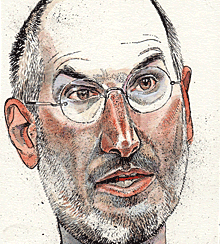Illustration by Jack Unruh
Steve Jobs’s business feats were legendary long before he died in October 2011. Apple Inc., considered a niche player for much of its history, is the most valuable company in the world by market capitalization as of this writing. Most business leaders would be thrilled to achieve Jobs’s level of market success, but should they aspire to lead like him? Before doing so, they should dig into his management style. Jobs the leader was at once dynamic and controversial, and his success relied heavily on the genius of Jobs the innovator.
Many other prominent leaders leave legacies that become clear only with time; however, we can evaluate Jobs’s leadership with tremendous clarity already today. This is thanks to Walter Isaacson’s masterful, eponymous biography of the entrepreneur (Simon & Schuster, 2011), a 600-page account that rarely feels flabby or boring. Jobs pursued Isaacson, a former CEO of CNN and managing editor of Time, for five years (the first of many examples of Jobs’s persistence in the book), and then gave him a free hand (a much rarer occurrence), promising: “It’s your book. I won’t even read it.”
The leader Isaacson portrays could have illustrated the Great Man theory popular in the mid-19th century, with its heroic leaders whose decisions and sheer force of will determined the world’s course. Steve Jobs was certainly a willful and driven leader, and the products and services he directed his companies to develop and commercialize changed the way many of us live, as well as the course of a diverse set of industries, including computing, publishing, movies, music, and mobile telephony.
At the same time, Jobs’s leadership style was complex. He was intensely focused when committed, confident enough to take risky leaps, and charismatic enough to enlist legions of employees and customers in the relentless pursuit of his aspirations. He was also interpersonally immature well into his adult life: impatient, stubborn, and hypercritical, if not downright cruel at times. Jobs may have been, as Isaacson says, “the greatest business executive of our era,” but he was a mercurial, demanding, and tyrannical one. All too often he was the antithesis of the “servant leader” model popularized in the 1990s (the giving, caring organizational mentor who in many ways contrasted with the hero model of a century prior).
However, Jobs’s seemingly destructive behaviors sparked peak performance as much as they undermined it, depending on where and how he applied them. They also helped shape the unique and powerful cultures Jobs seeded — twice at Apple, as well as at NeXT and at Pixar. (And few would have predicted Pixar’s runaway success in movie animation. Certainly not the Walt Disney Company, which eventually bought Pixar to secure its hit-making abilities, an action that made Jobs Disney’s largest shareholder.) Far better than most leaders, Jobs intuitively understood the power of cultural influence in sustaining the strategic capabilities implicit in his perpetual vision of creating, as he put it, “an enduring company where people were motivated to make great products...a company that will stand for something a generation or two from now.” It’s hard to argue with that aspiration; time will tell whether Apple makes it happen.
Jobs’s volatile approach to leadership is both fascinating and perplexing. For instance, Jobs had a fickle commitment construct — he fell in and out of love with people much too easily, both personally and professionally. In his relentless pursuit of top talent, he was able to create highly skilled organizations. But he also missed the potential contribution of many people who were not yet (and perhaps never would be) so-called A players. It is surprising, however, that many of the people Jobs abandoned along the way retained a grudging respect for his positive qualities — and a few even came back for more of his particular brand of abuse. via strategy-business.com
Want to bring new products and services to market faster? Want to be more agile? Need a compelling speaker? Hire Innovation and Growth Speaker Jim Woods. Jim works confidentially with start ups, governments as well as profit and for profit enterprises.
Visit our website:www.innothinkgroup.com Executive and Business Coaching: http://ow.ly/anBpK
Jim Woods is president and founder of InnoThink Group. A global management consulting firms specialized solely in helping organizations of all sizes in all industries catalyzing top line growth through strategic innovation and hypercompetition. Jim has over 25 years consulting experience in working with small, mid size and Fortune 1000 companies. He is a former U.S. Navy Seabee and grandfather of five. To arrange for Jim to speak at your next event or devise an effective growth strategy email or call us at 719-649-4118 for availability.james@innothinkgroup.com
Follow us on Twitter: http://ow.ly/anyCg
Follow us on LinkedIn: http://ow.ly/anyJu
Fan us on Facebook: http://ow.ly/anyQ7

No comments:
Post a Comment